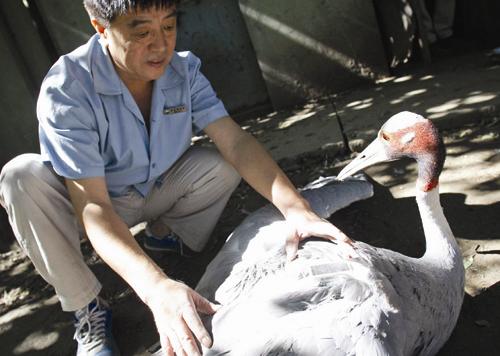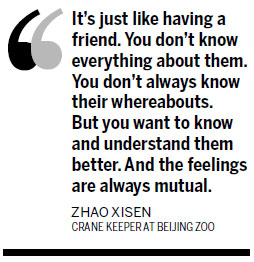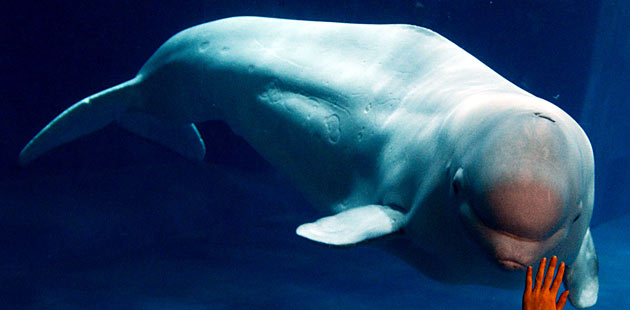Crane whisperer
Updated: 2012-09-19 10:29
By Sun Ye (China Daily)
|
||||||||
 |
|
Zhao Xisen has created a strong bond with the hooded cranes at Beijing Zoo, and the perennially tense birds allow Zhao to stroke them. Zhang Wei / China Daily |
Zhao Xisen has managed to help a pair of hooded cranes at Beijing Zoo conceive after seven years of infertility. Sun Ye finds out more.
After seven years of infertility, the hooded cranes (Grus monacha) at Beijing Zoo are finally able to carry on their family line, with assistance from Zhao Xisen, who is an animal polyglot, vet, animal shrink and crane keeper.
With 30 years of self-taught crane-breeding experience, the mellow-voiced man says the secret of his success is to befriend the cranes. He gets to know them, respect them, and help them.
Over the past years, the 58-year-old Zhao has been documenting, feeding and matchmaking more than 500 cranes of rare species at Beijing Zoo.

"These hooded cranes are extremely watchful and cautious," Zhao says.
He has created such a strong rapport with the birds that the perennially tense white-heads allow Zhao to pat them. Normally, the cranes are so guarded against strangers that they launch themselves at the cage's railings whenever a stranger gets too close.
They are by nature a timid species - a whiff of strong wind or a squeak too loud will frighten them. These birds will not ovulate if there is the slightest change in their surroundings, which is why they have not been producing any offspring.
Although Zhao, winner of last year's Beijing Occupational Skills Competition for his crane-raising abilities, has reared more than 500 endangered cranes during the span of his career, making cranes conceive has proven to be a challenge.
Zhao decided to move the uptight crane couple to a reclusive corner on the zoo's island of cranes to provide them a serene sanctuary. "My team and I tried to learn their habits and create a comfortable environment," he shares.
To his team's delight, the cranes looked comfortable and calm - a positive sign to conceive.
But last year, the hopeful team's spirits were crushed when they saw squashed eggs within the compound. The overly alert and protective parents had sniffed danger and killed their unborn babies before the hypothetical enemies did.
Zhao and his colleagues quickly devised a new plan. They got a surrogate mother, months before the breeding season. The Siberian crane, more sedentary and careless, was to hatch for the edgy couple.
The arrangements brought Zhao a moment of glee. After 20 days of hatching, he placed one egg on the table for routine inspection. The egg staggered on its own accord.
"I was so excited. There was life!" he recalls.
On June 21, Zhao witnessed a 80-gram newborn.
But his joy was short-lived. The very next day, he had to address a crisis - a second crane was born at midnight but because the surrogate mother did not notice it, it caught a cold.
"When I cradled it in my palm the next morning, the little one couldn't raise its head," says Zhao. "It was gasping for air, eyes immobile, its feet collapsing to a kneeling position. But I didn't give up."
He mixed some amoxycillin meant for children's respiratory illnesses with some minced meat, yolk and corn bread. Slowly, the weak one recovered to Zhao's relief. The young survivor is now almost 0.7 meters tall.
Having spent so much time together, the cranes have grown to trust Zhao. They seem to share a language, only comprehensible to Zhao and the birds.
"The birds only react to Zhao when Zhao speaks to them, but I don't get the same reaction when I talk to the cranes," says Wang Xiaoyin, Zhao's apprentice.
There are a dozen other kinds of cranes on the island, separated by a gate and closed to the public to ensure the cranes' privacy. Zhao "speaks" different crane languages to communicate with them.
As an animal psychiatrist, he is able to peer into a crane's eye and parse its mood. With one look, he can tell if an animal had a spoiled childhood spent in an affluent zoo, or is from a nuclear family in the wild.
But Zhao opines that the art of crane-raising is impossible to impart. He says charts and books are unreliable. And it is insufficient to listen to the experiences of others. "If you put your whole heart into it, you will not fail. You have to try to trace their footsteps."
Zhao did not choose this vocation. He started working in the zoo after graduating from middle school, but at that time he didn't think he would make it a lifetime career.
With no special skills and a vague understanding of the "elegant creature" which supposedly has a long life span, he treated the birds like how he would a human friend.
Now, decades later, he can interpret the bird's slightest chirps.

He misses communicating with a demoiselle crane. "The demoiselle, like a Chinese princess, is delicate and dependent," Zhao says, adding that the demoiselle used to follow him around and would sometimes dance for him.
"It's just like having a friend. You don't know everything about them. You don't always know their whereabouts. But you want to know and understand them better. And the feelings are always mutual," adds Zhao.
Contact the writer at sunye@chinadaily.com.cn.











